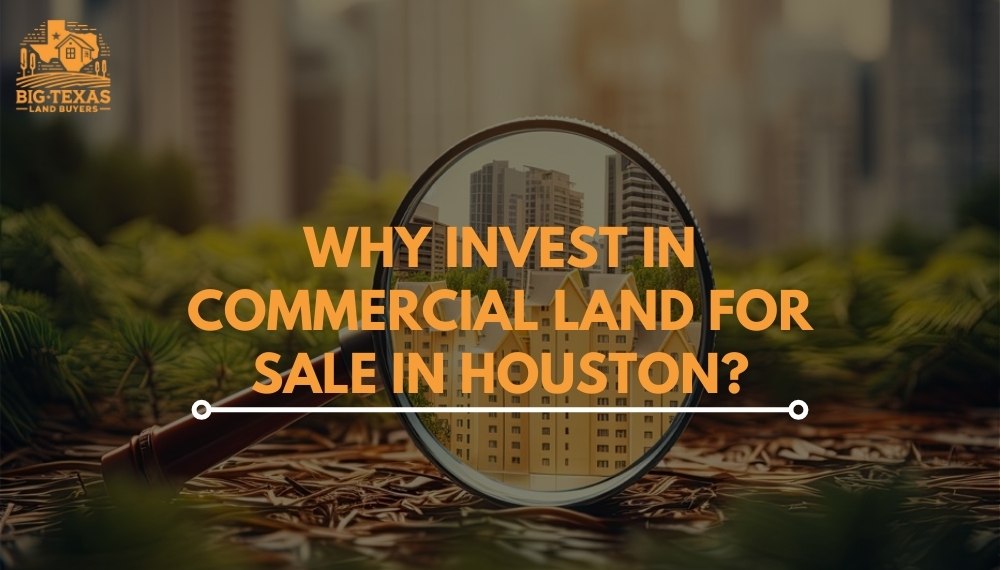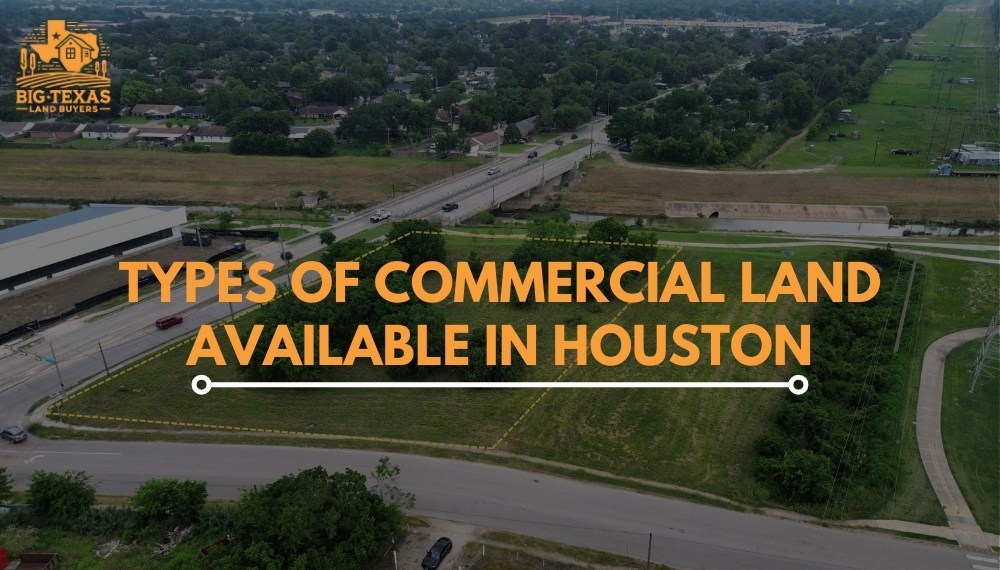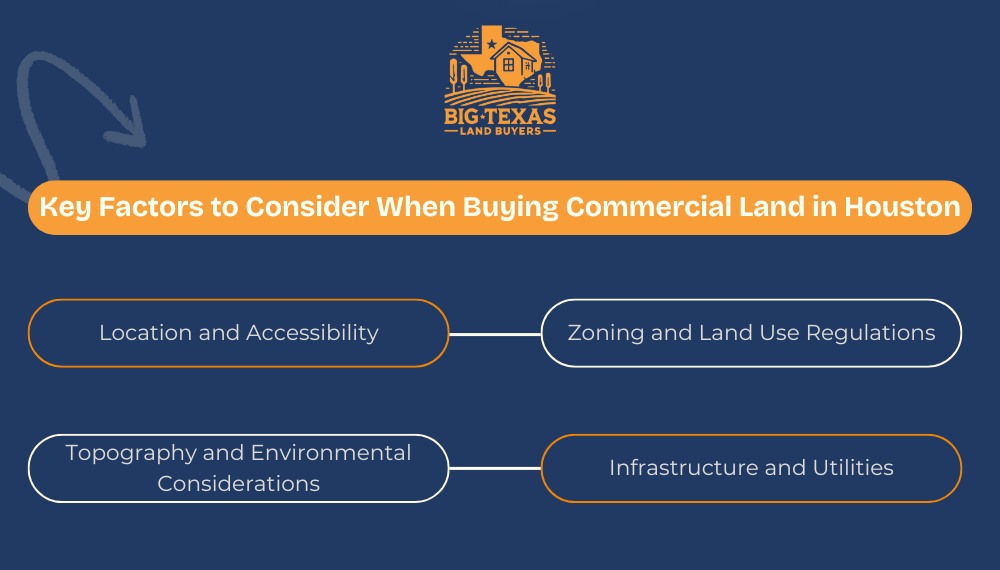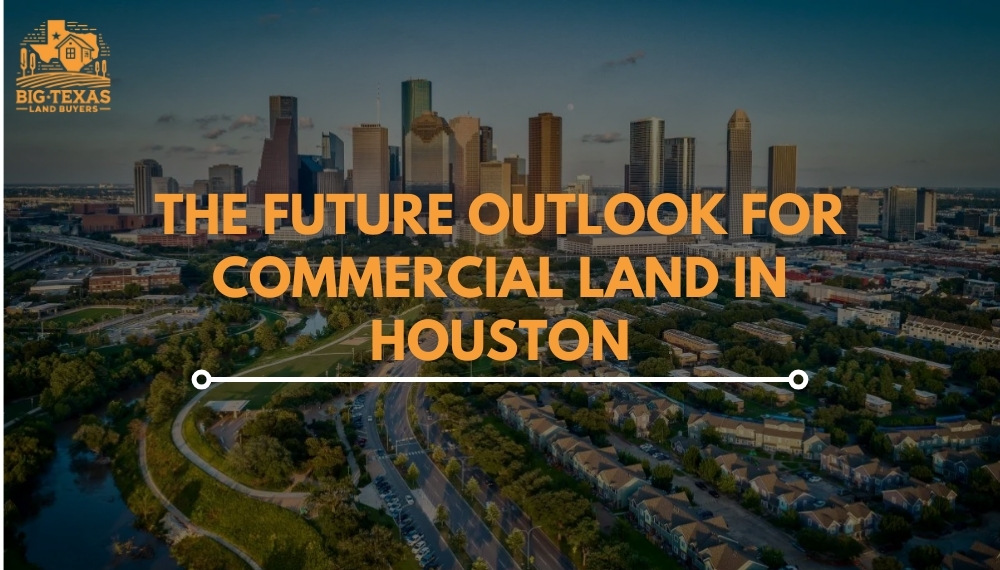Houston, Texas, is one of the fastest-growing metropolitan areas in the United States, making it a prime location for commercial real estate investment. With its diverse economy, strategic location, and ongoing urban expansion, Houston offers numerous opportunities for purchasing commercial land. Whether you’re an investor looking to develop a new retail center, an industrial facility, or office space, the city’s robust economy and population growth provide a fertile ground for successful ventures. Buying Commercial Land in Houston.
This article provides an in-depth guide to buying commercial land for sale in Houston, covering everything from the types of commercial land available, the factors to consider, legal and financial aspects, and the future outlook of Houston’s commercial real estate market.
1. Why Invest in Commercial Land for sale in Houston?

Houston is not only the largest city in Texas but also one of the most economically vibrant cities in the country. The city is known for its strong job market, diverse industries, and pro-business environment. Here are some compelling reasons to consider investing in commercial land in Houston:
A Thriving Economy
Houston’s economy is driven by several key industries, including energy, healthcare, aerospace, manufacturing, and technology. The city’s diverse economic base provides stability and resilience, making it less vulnerable to market fluctuations. This economic strength translates into a robust demand for commercial properties, from office spaces to industrial parks.
Strategic Location
Houston’s strategic location near the Gulf of Mexico and its status as a major transportation hub make it an ideal location for businesses that rely on logistics and trade. The city is home to the Port of Houston, one of the busiest ports in the United States, and boasts extensive highway and rail networks, making it a key player in domestic and international trade.
Population Growth
Houston is one of the fastest-growing cities in the U.S., with a population that continues to expand rapidly. This growth fuels demand for commercial developments, including retail centers, office buildings, and industrial facilities, as businesses seek to serve the increasing number of residents.
Favorable Business Climate
Texas is known for its pro-business environment, and Houston is no exception. The city offers a favorable tax climate, with no state income tax and relatively low property taxes compared to other major cities. Additionally, Houston’s regulatory environment is business-friendly, making it easier to obtain permits and approvals for commercial developments.
2. Types of Commercial Land Available in Houston

Houston’s vast and varied landscape offers a wide range of commercial land options to suit different business needs. Some of the most common types of commercial land available in Houston include:
Retail Land
Retail land is typically located in areas with high foot traffic and visibility, making it ideal for businesses that rely on customer visits, such as stores, restaurants, and service providers. Houston’s growing population and diverse demographics make it a prime market for retail development.
- Shopping Centers: Land suitable for developing shopping centers or strip malls can be found in suburban areas like Katy, Cypress, and Sugar Land, where new residential communities are driving demand for retail services.
- Standalone Retail: Smaller plots for standalone retail stores or restaurants are often available in urban areas like Midtown, The Heights, and Montrose.
Office Land
Office land is intended for the development of office buildings, corporate headquarters, or mixed-use developments that combine office space with retail or residential units. Houston’s strong economy and job market create a consistent demand for office space.
- Downtown Houston: The central business district is home to many of the city’s skyscrapers and large office complexes, making it an attractive location for corporate offices and financial institutions.
- Suburban Office Parks: As more companies embrace remote and hybrid work models, suburban office parks in areas like The Woodlands and Westchase are becoming increasingly popular.
Industrial Land
Industrial land is designated for manufacturing, warehousing, distribution centers, and other industrial uses. Houston’s strategic location and excellent transportation infrastructure make it a hub for industrial activities.
- Port of Houston Area: Land near the Port of Houston is highly sought after for industrial uses, particularly for businesses involved in logistics, shipping, and manufacturing.
- Energy Corridor: Located along Interstate 10, the Energy Corridor is a prime location for businesses in the energy sector, offering proximity to major oil and gas companies.
Mixed-Use Land
Mixed-use land allows for the development of projects that combine residential, commercial, and sometimes industrial uses. These developments are increasingly popular in urban areas where space is limited, and there is a demand for live-work-play environments.
- Urban Developments: Mixed-use developments in areas like Midtown and the Galleria offer a blend of office spaces, retail outlets, and residential units, catering to the growing trend of urban living.
3. Key Factors to Consider When Buying Commercial Land in Houston

Investing in commercial land is a significant decision that requires careful consideration of various factors to ensure a successful outcome. Here are some key aspects to keep in mind when buying commercial land in Houston:
Location and Accessibility
Location is one of the most critical factors in commercial real estate. The success of your commercial development will largely depend on its location and accessibility to customers, clients, and employees.
- Proximity to Major Highways and Transportation Hubs: Ensure that the land is easily accessible from major highways, public transportation, and airports. This is particularly important for businesses that rely on logistics and distribution.
- Visibility and Foot Traffic: For retail developments, visibility and foot traffic are essential. Choose a location that is highly visible from main roads and is situated in an area with a high volume of pedestrian traffic.
Zoning and Land Use Regulations
Understanding zoning laws and land use regulations is crucial before purchasing commercial land. Zoning laws dictate how the land can be used and what types of structures can be built.
- Zoning Classification: Verify that the land is zoned for commercial use and check for any specific restrictions that may affect your development plans. Houston is known for its lack of zoning laws in certain areas, but this does not mean there are no regulations—ensure you fully understand the local ordinances.
- Land Use Restrictions: Be aware of any land use restrictions, such as height limits, setback requirements, and parking regulations. These restrictions can impact the design and scope of your project.
Topography and Environmental Considerations
The topography and environmental conditions of the land can significantly impact your development plans and costs.
- Flood Risk: Houston is prone to flooding, so it’s essential to assess the flood risk of any land you are considering. Consult FEMA flood maps and consider the cost of flood mitigation measures.
- Soil Quality: Conduct soil testing to determine the suitability of the land for construction. Poor soil quality can lead to increased foundation costs and long-term structural issues.
Infrastructure and Utilities
Access to infrastructure and utilities is a critical consideration when buying commercial land.
- Utility Availability: Ensure that the land has access to essential utilities such as water, electricity, sewage, and internet. If utilities are not readily available, consider the cost of extending services to the property.
- Road Access and Traffic Flow: Check if the land has direct road access and assess the traffic flow in the area. Easy access and smooth traffic flow are vital for attracting customers and clients.
Market Demand and Future Growth
Understanding the current market demand and future growth prospects in the area is essential for making a sound investment.
- Market Analysis: Conduct a market analysis to determine the demand for the type of commercial development you plan to build. Consider factors such as population growth, economic trends, and competition.
- Future Development Plans: Research planned developments in the area, such as new highways, public transportation projects, or commercial centers. These developments can increase the value of your land and attract more businesses and residents.
4. Legal Considerations and Due Diligence

Purchasing commercial land involves complex legal considerations and due diligence to ensure a smooth and successful transaction.
Title Search and Ownership Verification
Before purchasing commercial land, it is essential to conduct a thorough title search to verify ownership and ensure there are no liens or encumbrances on the property.
- Title Insurance: Consider purchasing title insurance to protect yourself from future disputes or claims against the property.
- Boundary Survey: Have the land surveyed to verify property boundaries and avoid any disputes with neighboring landowners.
Environmental Assessments
An environmental assessment is critical, especially for industrial land, to identify any potential environmental hazards that could affect your development plans.
- Phase I Environmental Site Assessment: This assessment identifies potential environmental risks, such as soil contamination or hazardous materials. If issues are found, a Phase II assessment may be necessary for further investigation.
- Wetlands and Protected Areas: Check for the presence of wetlands or protected areas on the property, as this could restrict your ability to develop the land.
Financing and Taxes
Understanding the financial aspects of purchasing commercial land is crucial for making an informed decision.
- Commercial Land Loans: Research financing options, including commercial land loans, which differ from traditional residential mortgages. Lenders typically require a larger down payment and charge higher interest rates for commercial properties.
- Property Taxes: Be aware of the property tax rates in the area. Texas has relatively high property taxes, which can impact your overall investment costs.
- Tax Incentives: Investigate any available tax incentives or abatements for commercial developments in Houston. Some areas may offer tax breaks to encourage development and investment.
5. The Future Outlook for Commercial Land in Houston

Houston’s commercial real estate market continues to evolve, with several trends shaping the future outlook for commercial land investment.
Urban Redevelopment and Infill Projects
As Houston’s urban core becomes increasingly dense, there is a growing trend towards urban redevelopment and infill projects. Developers are repurposing underutilized or vacant land in established neighborhoods for new commercial developments. This trend offers opportunities for investors to acquire prime land in desirable locations close to downtown and other business districts.
Suburban Expansion
Houston’s population growth is driving demand for commercial developments in suburban areas. As more residents move to the suburbs, there is a need for retail centers, office parks, and industrial facilities to serve these growing communities. Suburban expansion presents opportunities for investors to purchase land in emerging markets before prices increase.
Sustainability and Green Building
Sustainability is becoming an increasingly important consideration in commercial real estate. There is a growing demand for environmentally-friendly buildings that incorporate green technologies and sustainable practices. Investors who prioritize sustainability may find opportunities in developing green buildings or acquiring land suitable for renewable energy projects, such as solar farms or wind turbines.
Technological Advancements
Technological advancements are transforming the commercial real estate industry, from smart buildings to e-commerce-driven industrial developments. Investors who embrace technology and innovation can capitalize on these trends by developing tech-driven commercial properties or investing in land that supports emerging industries, such as data centers or logistics hubs.
Conclusion
Buying commercial land for sale in Houston, Texas, is a strategic investment that offers numerous opportunities for growth and success. Whether you’re looking to develop retail space, office buildings, or industrial facilities, Houston’s thriving economy, strategic location, and favorable business climate provide a solid foundation for commercial real estate ventures.
However, investing in commercial land requires careful consideration of factors such as location, zoning, environmental conditions, and market demand. By conducting thorough due diligence and understanding the legal and financial aspects of the transaction, you can make informed decisions that align with your investment goals.
As Houston continues to grow and evolve, the demand for commercial land is likely to increase, making it an ideal time to explore the possibilities and secure your place in this dynamic market.
Follow us:

